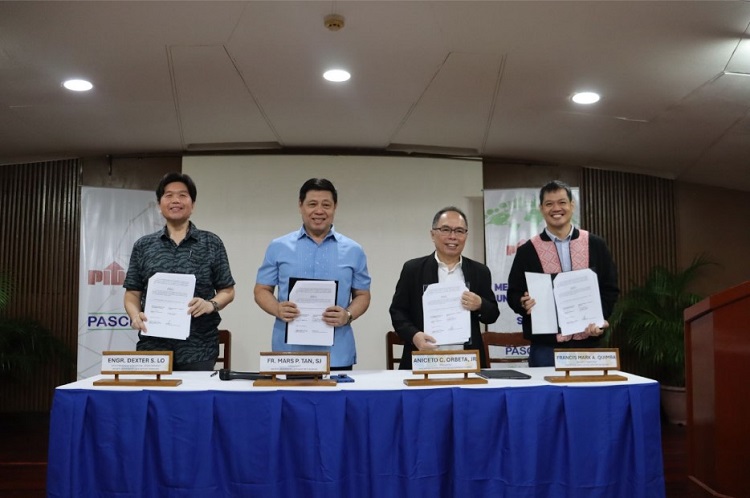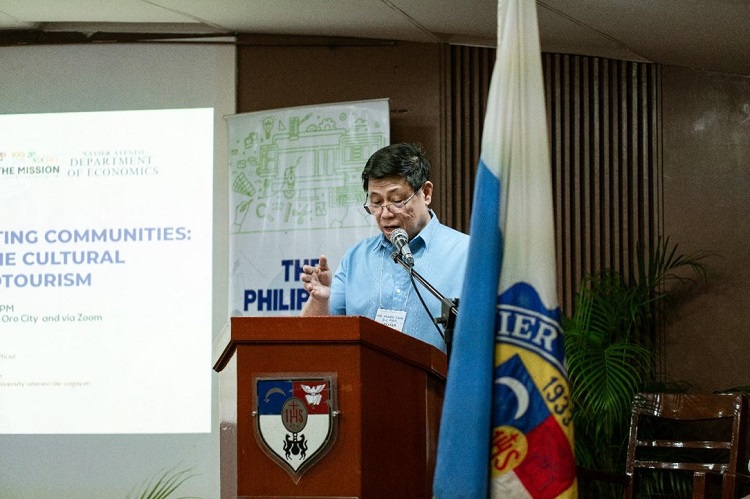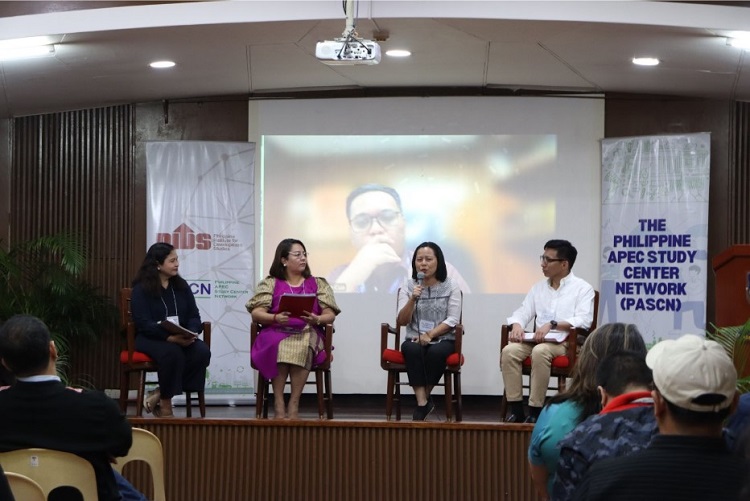By John Louis R Caga
SLP Formator

In Photo: Ceremonial MOU Signing on XU’s renewal of membership to the Philippine APEC Study Center Network (PASCN)
The Philippine APEC Study Center Network (PASCN) and Xavier University (XU) jointly held the symposium, "Sustaining Heritage, Innovating Communities: The Future of Philippine Cultural MSMEs and Agroecotourism," at Xavier University-Ateneo de Cagayan on 10 March 2025 as part of the Social Development Week Celebration.
The event was attended by representatives from the Philippine Institute for Development Studies (PIDS), the Department of Interior and Local Government (DILG) Regional Office 10, XU administrators, faculty, students, virtual participants, and other stakeholders. The symposium focused on promoting cultural MSMEs and agroecotourism as potential drivers of the nation's economic growth.

In Photo: Fr Mars P Tan, SJ, delivfers his opening message in the XU-PASCN Symposium”
The program commenced with an opening message from Fr Mars P Tan, SJ, University President, who emphasized Xavier Ateneo's crucial role in supporting cultural MSMEs and agroecotourism in Mindanao through various initiatives, particularly research. Fr Mars concluded his message by highlighting the importance of "Pagkakaibigan" (friendship) in partnerships and collaborations, stating, "The stronger the friendship with your collaborators, the more productive you are." This vision resonates deeply with the XU community as it is through close ties and collaborative efforts, that the XU community can sustain its initiatives and effectively address developmental challenges at the local, regional, and national levels.
The keynote speaker Dr Aniceto C Orbeta Jr, President of the Philippine Institute for Development Studies (PIDS), underscored the transformative potential of Micro, Small, and Medium Enterprises (MSMEs) and agroecotourism in development studies, particularly regarding their contributions to the national economy and cultural heritage preservation. However, he acknowledged that their growth is accompanied by sustainability challenges. Dr Orbeta suggested that strengthening capacity building, fostering innovation through digital technologies like GIS maps, promoting international cooperation, expanding market access, and providing financial support are crucial for addressing these challenges.
The symposium featured two expert resource persons. Dr Karenina B Romualdo, acting Vice President for Business Affairs at Central Luzon State University (CLSU), presented her discussion, "Advancing Innovation in Philippine Cultural MSMEs: Balancing Tradition and Modernization." 1 Following her presentation, Dr Jerelyn B Medalla, Assistant Dean of the College of Agriculture at Xavier University-Ateneo de Cagayan, shared her research, "Developing and Sustaining Agroecotourism through a Community-based Approach," focusing on the community in Barangay Lantud, Talakag, Bukidnon

In Photo: Open forum with resource persons & discussants (from the left) Dr Glenda T Orlanes, Dr Karenina B Romualdo,
Dr Jerelyn B Medalla, Mr Jhon Louie B Sabal (facilitator), and at the back Mr Richardson T Cua (joining virtually).”
The event proceeded with two discussants. Mr Richardson T Cua, Chief Economic Development Specialist and Officer-in-Charge Regional Director of the National Economic and Development Authority (NEDA) Regional Office 10, affirmed both presentations. He emphasized the crucial role of multi-agency collaboration and interventions in advancing cultural MSMEs and agroecotourism, highlighting the importance of technology and innovation in developing these sectors for economic benefit. The second discussant, Dr Glenda T Orlanes, a professor from the College of Agriculture and Economics Department at Xavier University-Ateneo de Cagayan, focused on the potential of agroecotourism to reduce rural farmers' reliance on seasonal farming. She stated, "Agroecotourism is an innovative bridge between agriculture and tourism," enabling communities to utilize their local sites effectively and manage their natural resources efficiently.
The symposium concluded with a challenge to the youth, particularly students. As the generation that predominantly uses technological advancements, including Artificial Intelligence (AI), and as the future leaders, they were urged to consider how they can contribute to the development of cultural MSMEs and the advancement of the country's agroecotourism initiatives. However, it was emphasized that universities must also prioritize cultivating academically excellent and socially responsible youth, enabling them to reach their full potential. Ultimately, the active participation of all sectors, from the youth to primary industries, is essential and must be evident in our collective pursuit of social development.